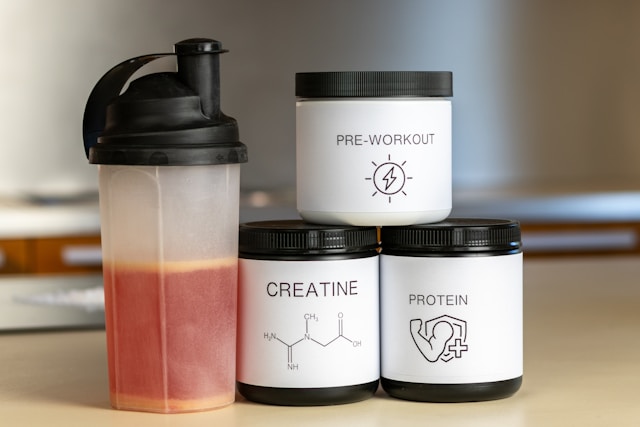Kicking off a workout plan can be thrilling yet daunting. The market brims with products that claim to speed up results, boost performance, and aid recovery, which can leave newbies feeling confused about fitness supplements. While no supplement can take the place of a well-rounded diet and regular training, some products can back your goals and help you transition more into an active life. Here’s a rundown of five key supplements that help folks who are new to working out.
Contents
Protein Powder: The Stuff That Builds Muscle
Protein plays a key role in fixing and building muscle, which is why protein powder stands out as one of the most popular and useful supplements for beginners. No matter if you’re pumping iron doing cardio, or just using your body weight, your muscles need enough protein to bounce back and get stronger.
Whey protein digests making it great to consume after working out. Plant-based options like pea or rice protein work well for people with special diets. Newcomers can drink a protein shake after exercise or between meals to hit their daily protein targets without cooking lots of protein-rich dishes.
Creatine: Boost Your Strength and Performance
Creatine occurs in muscle cells and helps create energy during tough workouts. Athletes and researchers have studied this supplement. It has proven benefits to increase strength, power, and lean muscle.
Creatine can help beginners boost their workout performance and cut down on tiredness during weight training. You take small amounts, and it’s safe to use long-term if you follow the directions. To kick off your fitness journey try a basic creatine monohydrate supplement – it’s cheap and proven to work.
Pre workout: Giving You Energy and Focus
It can be tough to get pumped for a workout when you’re new to it. This is where a pre workout supplement comes in handy. You take these products about 20-30 minutes before your exercise. They often have stuff like caffeine, beta-alanine, and nitric oxide boosters to ramp up your energy, sharpen your focus, and boost your stamina.
While not a must for everyone, pre-workout supplements can give new gym-goers a boost to push past tiredness and stick to their routine. It’s smart to begin with a small amount to see how your body reacts and pick a product that matches what you want—some give you energy, while others focus on muscle pumps or lasting power.
Omega-3 Fatty Acids: Helping Recovery and Joint Health
Omega-3 fatty acids often found in fish oil pills, have many health perks that go beyond just fitness. For people new to working out, omega-3s can cut down on swelling, support healthy joints, and speed up recovery after exercise. This comes in handy for those who feel sore or stiff as their bodies get used to new physical challenges.
Along with their ability to reduce inflammation, omega-3s have a positive impact on heart and brain health, which makes them a worthwhile addition to any wellness plan. Search for top-notch fish oil supplements that contain a proper ratio of EPA and DHA and think about taking them with food to boost absorption.
Multivitamins: Bridging Nutritional Shortfalls
Even if you eat a balanced diet, you might struggle to meet all your nutritional requirements —when you start a new workout plan that increases your body’s need for specific vitamins and minerals. Taking a daily multivitamin can help bridge these gaps and boost your overall health and energy levels.
For those just starting out, picking a multivitamin designed for active people can make sure you get enough of essential nutrients like vitamin B, vitamin D, magnesium, and zinc. These nutrients have a big impact on energy metabolism, muscle function, and immune support. All these are key when you’re just beginning your fitness journey.
Conclusion
Getting started with supplements doesn’t need to be a headache for workout newbies. You can back your body’s needs and boost your fitness journey by zeroing in on basic products. These include protein powder, creatine, omega-3s, multivitamins, and pre-workout mixes. Keep in mind, supplements should add to—not take the place of—a balanced diet and regular exercise plan. If you take the right approach and get a bit of guidance, these tools can help you gain traction and keep you pumped up as you work towards better health.

